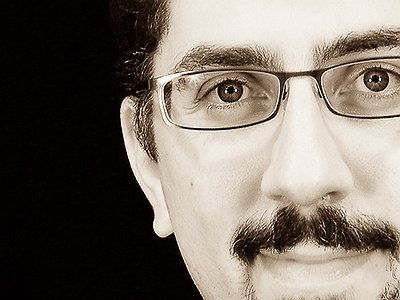Universal and timeless truths
Relevance, of course, is never just a function of sales figures and concert attendance records, but also of an art form's potential to bring about political, social, perceptive and emotional response. With this in mind, what, would you say, is the relevance of contemporary composition today? What can it offer to audiences that other, more popular forms of music can not?
Michael Hammond / You know, with the barriers so fluid now, it's really hard to say. I'd have to let others speak about relevance, but with regard to what composition can offer audiences, there's definitely a degree of intention and precision that is unique to classical music. Of course, the precision often comes at the expense of other good - less quantifiable - things, like vibe, groove, etc.
In truth, I feel weird talking about these things in such cut-and-dry terms; it feels reductive. I think it's less about one genre affecting another and more about individuals affecting each other.
Nimrod Borenstein / Contemporary music is an art form and thus not only entertainment. As such it should be capable of conveying in the language of our time some of the universal and timeless truths about the human condition and aspirations. This essential role can both challenge the intellect and touch the heart of contemporary and future audiences like the music of Bach, Mozart, Beethoven, Stravinsky, Prokofiev and many other great composers will always do.
Bob Lord / By "contemporary composition" we are in some ways talking about music that is perceived to be devoid of easily discernible connotation, devoid of easily discernible context. This is in part because the possibility of musical content in harmonic, rhythmic, and melodic terms is so wide open that an easy, pat assessment of what a work “means” is far more difficult than in other musical genres. This of course is nothing new – just look at the music of Shostakovich.
But can't we as a culture just listen to something and like it or not like it, be moved by it or not moved by it, rather than analyze its implicit and explicit meanings or its impact on the history of music or its place in the lineage of art? I think that the urge to find meaning in every corner of every composition of every type is a truly twisted endeavor, and often says much more about the person imprinting their own meaning upon the art rather than the art itself.
For most people, pop music, and music that generally leans on lyrics to convey meaning and connect with an audience, is readily understandable in an emotional manner and therefore can foment change, prompt reaction, and impact culture faster and with greater immediacy. But I think this is much more than just a musical language problem, this is a cultural issue – why do we still make it so hard for people get “in”? The exclusionary bent in classical music is still omnipresent, and until that changes, the influence of this music that we all love so much will continue to wane, and what it can offer to the public will become increasingly irrelevant.
I believe that contemporary music offers the widest, most expansive, most comprehensive emotional experience possible – there is virtually nothing that it cannot convey, no mode of expression that is off-limits, no structural edifice that cannot be built. The possibilities are infinite.
And it’s not the music itself that’s keeping people away, it’s the attitude; things are clearly changing, but the change is too slow, we are not adapting, and we’re just trying to hold onto what only exists in our memories now. For example, I recently attended a concert by a very well-known award-winning string quartet; the audience consisted mainly of people who were unfamiliar with classical music – a segment of the public that PARMA seeks to attract, to engage, to communicate with, the people who are looking for an emotionally and intellectually and musically enriching experience but who might not know where to begin.
This is a story that has been told countless times already about other circumstances, but it is truly emblematic of the issues we face and bears repeating: the quartet played the first movement of the piece, and as soon as the sound faded out, the audience – who were clearly overcome with an exuberant joy of discovery and experience, you could see it their faces and body language – literally exploded into applause, as if they had been waiting an eternity to give their deep approval to these amazing musicians, this amazing music. It was fantastic.
And the quartet … well, a couple of the members looked at each other, smirked, rolled their eyes, chuckled audibly, and continued on. The mood changed. The people deflated. Their fears of making a mistake – making a mistake! At a concert, as a listener! – came true. This group is prodigiously talented, with a level of musicianship that is just extraordinary, but they put the audience under stress, and the music didn’t sound nearly as good to anyone anymore. Based on my experience I think that the quartet didn’t even notice.
Contemporary composition will remain right where it is now, on the fringes of our culture, until these attitudes change.
From your personal experience in your work, what is the role and importance of PR work, marketing and the media for the contemporary composition scene today? What are some of the challenges of getting this music into the media and, from your point of view, what are some of the problems in their portrayal of the music? In which way, do you feel, is the growing importance of marketing and PR perhaps even making it harder for exciting new music to find an audience?
Michael Hammond / Of course, you'd like to never think about PR in an ideal world. But yes, it's important. People in the classical world have gotten by for so long without having to think very much about attracting a younger crowd. But that model isn't tenable.
Bob Lord / For the professional music maker, it is just as crucial and vital to leverage one’s work as it is to create it in the first place. The days of “a piece finding its audience” are, to my mind, long gone – there is so much static to tune out, and the tastes of the public are now so fractured into various sub-sub-sub-genres that it is increasingly difficult to explore one silo, one concept without stumbling into a new one almost immediately, much less allow a piece to graze in the world on its own with our collective fingers crossed that it finds nourishment. The past was incredibly vertical in terms of genre, but we live in a lateral, horizontal world now, and that makes it all the more important to distinguish oneself and one’s work. It is both a problem and an opportunity.
Michael Hammond / Part of the problem with the media portrayal is that it's still so hung up on boundaries. The story is always, "this is classical and this is not-classical and they're coming together!" It's like, dude, Switched on Bach happened a long time ago, I think we're past that. It's just a cheap, easy story. But in reality it's a non-story. In my experience, most people like to hear things that challenge them, make them think. They don't care about genres or labels.
Dobrinka Tabakova / Any art which wishes to make a statement beyond the time in which has been created has a dimension, which is potentially difficult to ‘market’. And yet, it is important to try and highlight aspects, which could open a door for people.
Bob Lord / I think that the continued emphasis on repertoire, and the primacy of the performer over the composer, is a challenge for new music. If someone produces a new version of a previously existing film, that’s called a “re-make,” and in popular music, a new version is called a “cover.” But in classical music, it’s called “the vast majority of albums released every damn year.” Imagine if every year we got 20 or 30 re-makes of GONE WITH THE WIND? How about 100 covers of “Close To The Edge” by Yes? And what if those re-makes and covers absolutely dominated the mainstream press coverage of film or pop music? That’s essentially what’s been happening in classical music. There will always be a place for the great works both in the studio and on the stage – and we do indeed produce, record, and release some of them when the performances are compelling, different, and unusual – but with such a huge variety of fantastic music being produced it is time that the classical music community and press and creators make a conscious effort to change their diet, to alter their proportions. And if we can do that I think we will all see a true blossoming of this art form again.
Nimrod Boreinstein / Writing music is a very demanding work and does not leave much time for anything else, including relations with the media and promoters. It is therefore very helpful to be able to rely on professional people to help creating a wider audience for serious creation. Incidentally, it is thanks to my PR that I have the pleasure of having this dialogue with you! PR is a bit like any science. It's not its fault how it is used. It's the use of an idea that decides on whether it's good or bad. For me, the Internet corrects the somewhat one-sided view of the print press. Quite a few of my interview requests are coming from online sources. I think that's great.










